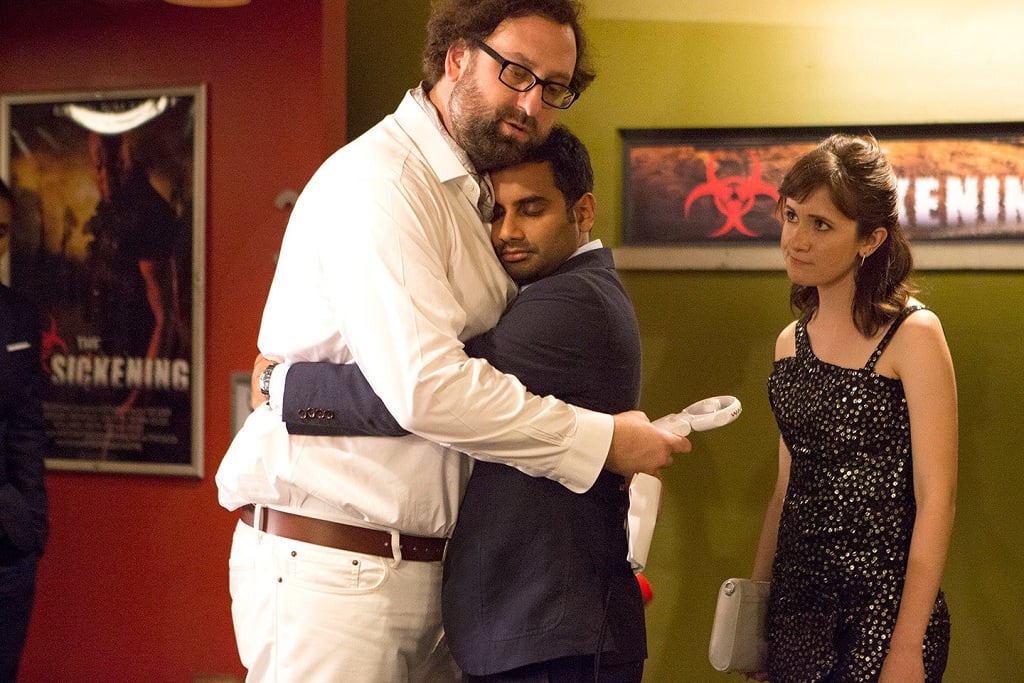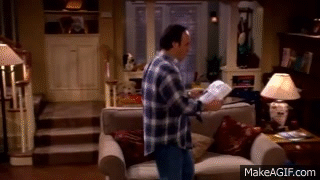Aziz Ansari’s New Show ‘Master Of None’ Isn’t Really About Him, And That’s What Makes It Great
Exploring racism, sexism and modern culture through loving stories of family and friendship, Tom Haverford has done grown up.

There are some celebrity lives that seem to beg for their own semi-autobiographical series. (Show me one person who wouldn’t watch a sitcom based on Drake’s everyday life). Others — as anyone who’s survived an episode of According To Jim would attest — can make you want to die.

This show lasted for eight years. Help.
In Aziz Ansari’s case, the prospect sat somewhere in the middle. It’d be fine enough to simply watch the comedian and Parks and Recreation star go about his blessed New York like: finding the best taco joint, drinking at his favourite bars, and going to Father John Misty gigs. However, it’s only after watching Master Of None that you get the sense such a show would do the guy a serious injustice.
Far from being as self-serving or pedestrian as those scenarios suggest, his new Netflix show released over the weekend is almost entirely about the concerns of other people. With characteristic naivety, Ansari’s character delves into the previously overlooked lives of his immigrant parents, his friends’ grandparents, his female friends and other Indian actors. As a result, each episode feels like a short film that tries to answer the question, “What’s up with that?” And, by removing himself from Master Of None’s spotlight, Ansari proves he’s a comedy writer to contend with the best of them.
–
Race, Gender And Genuine Hardship: A Light Take On Some Big Issues
What Girls is to young white women and Louie is to misanthropic older guys, Master Of None is for kids from immigrant families — and it’s a story that’s been a long time coming.
In episode two (aptly-titled ‘Parents’), Ansari’s Dev delves headlong into the disconnect between his everyday life and his parents’ past growing up poor and immigrating from India to America. Mapping the unimaginable differences, Ansari (who also directed the episode) cuts together the frivolous concerns of Dev and his American-Taiwanese friend Brian, with their fathers’ perilous histories.
Dev’s dad works tirelessly in a zipper factory through his early adulthood to save up enough to make the trip. Then, once he does set foot in the US, he’s treated as far worse than his white colleagues. Similarly, Brian’s dad leaves his impoverished life in Taiwan for the US and experiences the same systemic discrimination. Both men’s sons are only concerned with making it to the previews at a screening of the new X-Men movie.

“Dev lives in America, where his biggest problem is that the WiFi in his apartment is messed up.” Poor Dev.
As the son of a Malaysian immigrant myself, it was startling to realise I hadn’t seen this kind of point made on TV before, let alone in a comedy. In what other sitcom have an Indian family sat down with a Taiwanese family and discussed their experiences of immigration? It’s in the honest and authentic moments like these that Master Of None makes for one of the boldest debut seasons in recent years.
Even harder hitting is the thematic cold opening to the fourth episode, ‘Indians On TV’: a montage of questionable portrayals of Indian people on TV. Remember “when the Kutch went brown face?” for PopChips? Dev sure does.
He also recalls the ubiquity of brown face in the films he loved when he was a kid, particularly Fisher Steven’s stint as Indian scientist Ben Jahveri in Short Circuit 2. As Dev tells his fellow Indian actor Ravi, “They got a real robot and a fake Indian!” Ravi’s surprise and disgust at the revelation makes for one of the funniest moments in the series but also serves as a startling reminder of the choppy history of Indian characters on American TV — a history that Dev says is continuing to repeat itself to this day.
“Dude, it still happens. You see The Social Network? Max Minghella plays an Indian guy. He’s white, they browned him up.”
Later in the episode, Dev and Ravi audition for the same show, only to discover that “There can be one [Indian character], but there can’t be two.” Again, it’s presented as a jokey conversation and yet — in distilling the politics of people of colour on television down to the basic premise of Highlander — it cuts straight to the heart of the issue.
While Dev laments certain aspects of his own life — the lack of acting opportunities, some shitty dates — the show makes sure to balance his complaints with, you know, actual concerns. After Dev gets upset about stepping in dog crap and ruining his favourite “sneakies” after a night out, a female colleague tells him about her evening which includes being followed home by someone claiming to be “a nice guy”.
Thus begins the feminism-focused episode, ‘Ladies & Gentlemen’. When later regaling his girlfriend Rachel with the story over coffee, she references the fact that this sort of thing happens to a lot of women. Denise, Dev’s lesbian friend agrees and breaks it down for him: “If you’re born with a vagina, everybody knows, creepy dudes are just a part of the deal.” As a finisher, Rachel points to the difference in comments on their Instagram photos of the same frittata.
Dev’s notable comment: “Yumtown, population: Dev”.
Rachel’s: “I want to fuck your face.”
Clearly, Ansari and co-writer Alan Yang have instilled a deep self-consciousness into the DNA of the show, helping elevate Master Of None’s light tone into thoughtful exploration. In 2015, there’s nothing that TV-worthy about whiny, over-privileged 30-year-olds.
–
…And Then There’s The Romantic Stuff
Through all this, the series utilises the Netflix feeding frenzy structure to its full advantage, taking the opportunity to bounce between these topical arguments and Dev’s quirky, on-and-off romance with Rachel: a white, funny and charming music publicist. For the most part, it totally works. The lighter episodes showcase that signature Ansari wit and the surprise addition of some inspired cameos make them irresistible. Claire Danes is clearly having a ball playing the cynical food critic intent on cheating on her husband and Busta Rhymes excusing himself from a conversation with the line, “Good luck, I’m going to fuck with some of this shrimp” is reason enough to give the full series a ringing endorsement.
And yet, despite all the sharp, issues-based takedowns early on, the series does settle into conventional romantic plotlines towards the back-end. It’s a shame because Rachel and Dev actually make a uniquely magnetic couple and much of their bubbly romping feels worthy of its own movie. However, there’s only so much young adult indecisiveness an on-screen romance can handle across a four-and-a-half hour runtime and Rachel and Dev never really seem to find much else to argue about.
On the whole, Master Of None proves without a shadow of a doubt that Aziz Ansari is far more than the affable, excitable manchild he played on Parks and Recreation. The show is refreshing and confronting all at once. Mostly, this is due to the way Ansari and Yang shine a light on the people around Dev: showcasing a genuine exploration of bigger issues, a half-hour at a time.
It speaks volumes that Ansari cast his actual parents, Shoukath and Fatima, in the show to tell semi-autobiographical stories of their lives in his first season. As a master of none looking to become more worldly and in-tune with the people around him, Ansari knows it’s all about being genuinely interested in authenticity.
–
The first season of Master of None is now streaming on Netflix.
–
Sean is a freelance writer based in Melbourne with an unhealthy addiction to movies. With a background in journalism, Sean has written about his guilty pleasure for publications such as FilmInk and Beat magazines. He also tweets irregularly from @seanjseabass.